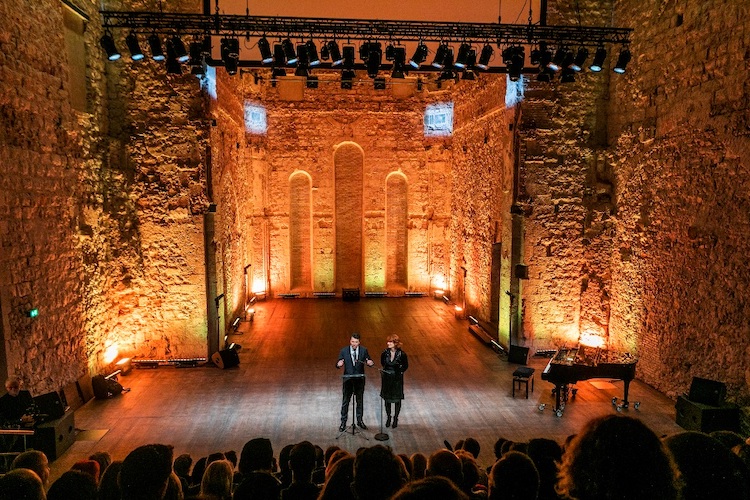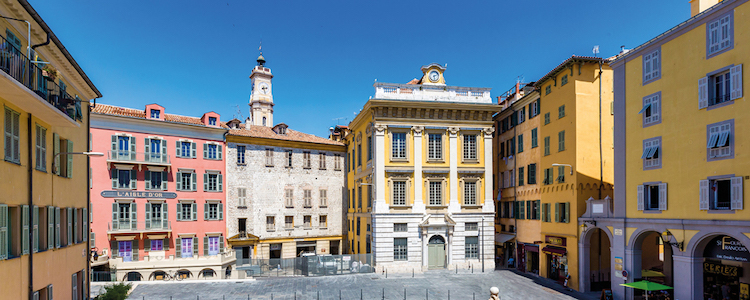Slated to partially replace the “old” National Theatre, the reconstructed and converted Franciscan church is a beautiful venue. But very few locals are happy with it.
It is like a line straight out of Molière’s Tartuffe: “If Heaven is all that stands now in my way, I’ll easily remove that little hindrance; Your heart need not hold back for such a trifle.” Deaf to the yearlong massive protests of much of the population, the mayor of Nice decreed the demolition of the existing Théâtre National (TNN) and pushed through his pet project of turning the historic Franciscan church into its successor.
But no sooner had Christian Estrosi and TNN director Muriel Mayette-Holtz soft-opened the new Salle des Franciscains in a private setting on April 7 than disgruntled Niçois had a nickname for it: “micro-theatre”. Which is not far from the truth, given that the smallest, most modest building on Place Saint François can hold only between 240 and 340 spectators, depending on configuration. Quite a step down from the capacity of 1,300 of the “old” and now sadly defunct TNN just a couple of hundred metres up the road. The building is even too small to house the typical appendages of any theatre: administrative offices, two rehearsal rooms (100m2 each), an actors’ foyer, and flats for artists in residence moved into the pink-coloured “Golden Eagle” building next door.
The historic Franciscan convent and church at the fringe of Old Nice, across from the fish market, is the oldest surviving building in town. Erected in the second half of the 13th century, it has had an eventful life. Desecrated during the Revolution, it became in turn a stable, a residential building, a nightclub, a cinema, and the municipal garbage truck depot. Although a historic monument, it had been neglected for decades before rehabbing work started several years ago.
After having been painstakingly reconstructed over the past years, the Salle des Franciscains is a dignified frame for cultural event, despite its decidedly bland exterior. The ancient walls of sober white-washed bricks with their recesses, and the absence of windows give the hall a feeling of intimacy and mystery. With its excellent acoustics it is certainly a wonderful venue for a dimly lit concert, a recital, or a reading. But theatre? Hard to imagine how to fit an elaborate, colourful scenography in here, not only stylistically but also architecturally.
On a technical level, the Salle des Franciscains is equipped with all the latest bells and whistles in the world of the performing arts. The stage area covers 200 m² and is multimodal so that shows can be performed in frontal, bi-frontal, tri-frontal or quadri-frontal configurations.
Instead of having a big, prestigious venue like the TNN – usually the pride and joy of any larger community – Estrosi and Mayette-Holtz are on a mission to decentralize theatre all over town, even in the problem neighbourhoods, and all the way to the future éco-vallée near the airport. This first of five new stages will thus replace the former TNN’s “small hall”, with others to follow over the next years. The pair can’t stop congratulating themselves and each other for that.
The Niçois population is less delighted with the whole idea though, citing concerns from opposition to the demolition of a major 20th century architectural monument to exorbitant costs for rebuilding, difficulty of getting to outlying locations (especially if dependent on public transportation), and security issues in the less desirable areas of town. And since their protests went unheard, many of the Niçois theatre goers who so far have stayed loyal to the TNN, are off to Anthéa in Antibes… incidentally run by Daniel Benoin, one the TNN’s former longtime directors.
Change is always hard, so maybe it’s best to just give the new venue a chance. The first play will be presented at Salle des Franciscains on April 26: Le Sourire de Darwin, written and performed by Isabella Rossellini and directed by Muriel Mayette-Holtz. But however good this may be, one thing is certain: the magic of stepping into a classic marble theatre foyer, and a grand hall, resplendent with red and gold décor, balconies, and that unique tingling anticipation, has gone for good. Signs of our blindly destructive times?
All photos and videos courtesy Ville de Nice




Leave a Reply